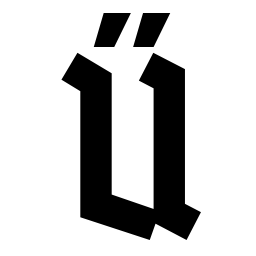String literals¶
String literals exist for specifying of some string values in an Ü program.
They are declared with "".
"simple string"
"в строке может встречаться почти любой юникод"
For some characters escaping is used:
"\b return"
"\t tabulation"
"\n newline"
"\r carriage return"
"\f new page"
"\" quote"
"\\ backslash"
"\0 binary zero"
It’s also possible to specify symbol code via its hexadecimal number:
"\u0000 zero"
"\u00DC Ü"
"\u0068 h"
String literal type¶
A string literal is an array with one of types char8, char16 or char32 as element type.
Array size is determined by the literal size.
By-default element type is char8, but it’s possible to specify it via special suffixes - u8 for char8, u16 for char16, u32 for char32.
u8 means UTF-8, u16 - UTF-16, u32 - UTF-32.
"abc абв"u8 // UTF-8 string, array element type is "char8"
"abc абв"u16 // UTF-16 string, array element type is "char16"
"abc абв"u32 // UTF-32 string, array element type is "char32"
Terminating zero¶
Unlike in C, C++ and other languages string literals in Ü are NOT terminating with zero.
If terminating zero is required, for C code interaction for example, it may be explicitly specified via \0 at the literal end.
"/etc/shadow" // No terminating zero, string size is 11
"/etc/shadow\0" // There is a terminating zero, string size is 12
"" // No terminating zero, string size is 0
"\0" // There is a terminating zero, string size is 1
String literals for single character¶
Single char literals are specified via single quotes ''.
By default such literals are of char8 type.
There are suffixes c8, c16, c32, char8, char16, char32 for explicit type specifying.
'J' // char8
'\t' // char8
'Q'c8 // char8
'~'char8 // char8
'Ё'c16 // char16
'й'char16 // char16
'\u00DC'c32 // char32
'ß'char32 // char32
